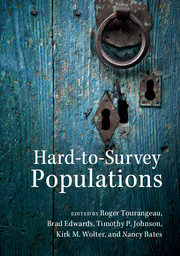Book contents
- Frontmatter
- Dedication
- Contents
- List of figures
- List of tables
- List of boxes
- List of contributors
- Preface
- Part I Introduction
- Part II Conducting surveys in difficult settings
- Part III Conducting surveys with special populations
- Part IV Sampling strategies for the hard to survey
- Part V Data collection strategies for the hard to survey
- Index
- References
Preface
Published online by Cambridge University Press: 05 September 2014
- Frontmatter
- Dedication
- Contents
- List of figures
- List of tables
- List of boxes
- List of contributors
- Preface
- Part I Introduction
- Part II Conducting surveys in difficult settings
- Part III Conducting surveys with special populations
- Part IV Sampling strategies for the hard to survey
- Part V Data collection strategies for the hard to survey
- Index
- References
Summary
Between rising costs and falling response rates, surveys certainly seem to have their problems these days. Yet, it also seems that surveys have never been more popular as a research tool than they are now. Every year, more and more federal surveys are done (Presser & McCulloch, 2012) and the rate of growth has, we suspect, been even faster for academic and commercial surveys. And it also seems to us that surveys are being done with an ever-wider array of groups and in an ever-wider range of settings than ever before. Groups that may once have been deemed impossible to survey – groups like the homeless, prostitutes, war refugees, victims of natural disaster, and persons with serious physical or mental disabilities – are now the target populations for surveys – maybe not routine surveys, but surveys nonetheless. This volume tries to capture the experiences and lessons learned that have accumulated over the years in doing surveys with such hard-to-survey populations. We hope that presenting some of the best of the recent work here will spur the development of methods for surveying these groups, moving the field beyond stories about individual experiences and toward a more systematic understanding of the problems and solutions.
- Type
- Chapter
- Information
- Hard-to-Survey Populations , pp. xxiii - xxviPublisher: Cambridge University PressPrint publication year: 2014



